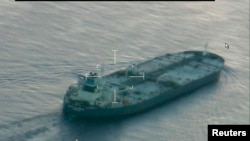A high-stakes dispute over a tanker carrying $100 million in Iraqi Kurdish crude took a surprising turn late Tuesday when a U.S. judge said she lacked jurisdiction given the ship's distance from the Texas shore and urged that the case be settled in Iraq.
Federal magistrate Nancy K. Johnson said that because the tanker was some 100 kilometers (60 miles) offshore, and outside territorial waters, an order she issued late on Monday for U.S. Marshals to seize the cargo could not be enforced.
She said the dispute between Iraq's central government and the autonomous region of Kurdistan should be resolved in Iraq.
Had ordered seizure
Overnight Johnson signed an order directing the marshals to seize the 1 million barrels of crude from the United Kalavrvta tanker anchored in the Gulf of Mexico.
Tuesday she scheduled a conference to give the two sides a chance to state their case.
The ship could simply sail away, though it also could offload its cargo for delivery to another U.S. Gulf of Mexico port outside of Texas, lawyers said.
Baghdad's lawyers had laid claim to the oil in a lawsuit filed on Monday, saying Kurdistan sold the crude without permission from the central government.
Baghdad, which is struggling to contain a Sunni Islamist insurgency that has captured swathes of central and northern Iraq, sees such oil sales as smuggling.
It has cut the KRG's budget since the start of the year over the oil sales dispute.
The latest dispute over exports reflects Iraqi Kurds' emboldened steps toward seizing greater political and economic autonomy, with oil sales seen as central to Kurdish dreams of independence that Baghdad opposes.
Courtroom battle
While the sides fought the legal battle in Houston, they pressed the political fight in the courtroom of public opinion.
Iraq warned companies against trying to buy other shipments of Kurdish crude after it won the seizure order, while Kurdish leaders asserted their right to sell the oil but said they would face obstacles.
"The Ministry of Oil in Baghdad continues to interfere directly and indirectly with KRG oil sales," said Karwan Zebari, an official with the Kurdistan Regional Government's representation in Washington.
A lawyer in Houston for the Kurds said the regional government would file its own claim of ownership for the cargo, a sign the legal standoff might continue.
Meanwhile, a Kurdish government official said export plans would be hurt.
"We have to acknowledge that the ruling of the U.S. court will definitely have negative consequences on the region's attempts to market its oil," he said of the order to seize the cargo. "Buyers now will start to step back and think twice
before purchasing Kurdish crude."
Washington has publicly opposed direct oil sales by the autonomous region, fearing they could contribute to the break-up of Iraq. It has stopped short of banning U.S. companies from buying the oil while warning them of potential legal risks.
US territory
Officials from the State Department and the U.S. Marshals Service said the judge's order could only be applied if the ship entered U.S. territory.
In this case, that would be 12 nautical miles from shore, said Martin Davies, a law professor and the director of Tulane University's Maritime Law Center in New Orleans.
If the oil's owner wants to stay out of U.S. courts, "they just have to order the ship to stay out," he said.
While the rulers of Iraq's northern Kurdish enclave have long aspired to independence, their position has strengthened in recent months as Kurdish Peshmerga troops have outperformed Iraqi soldiers against Islamist militants.
Kurds have also succeeded in cementing their control of land and oil reserves around the resource-rich city of Kirkuk, while Iraqi Prime Minister Nuri al-Maliki, a Shi'ite Arab who has been an adversary of Iraqi Kurds, has fallen out of favor in Washington.
At least one cargo of Kurdish crude was delivered to the United States in May to an unidentified buyer, and four other cargoes of Kurdish crude have been delivered this year in Israel.
The case is Ministry of Oil of the Republic of Iraq v. Ministry of Natural Resources of Kurdistan Regional Governate of Iraq et al, U.S. District Court, Southern District of Texas, No. 3:14-cv-00249.









